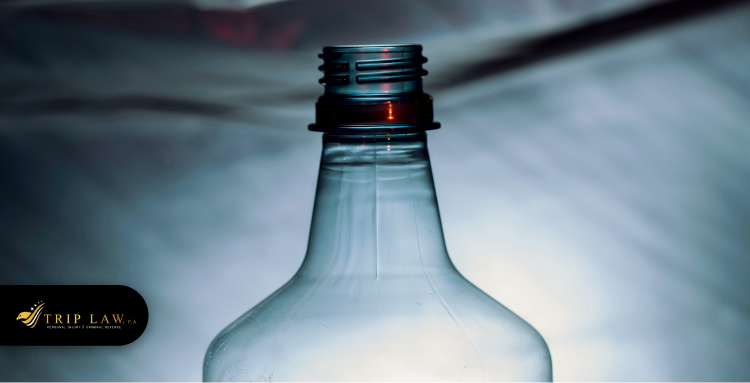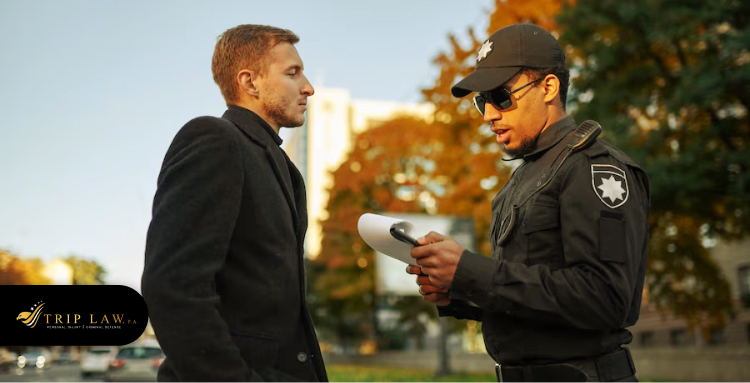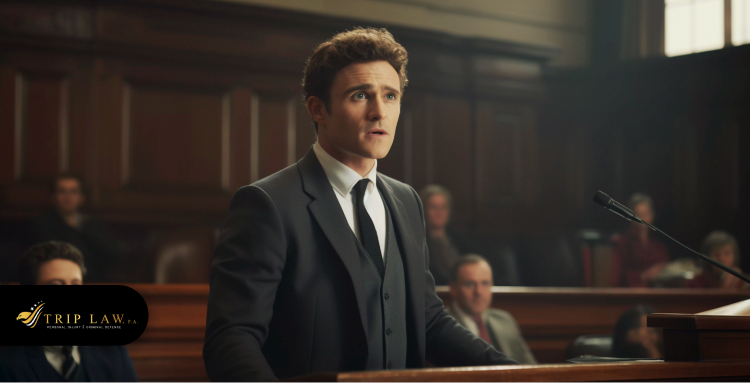
Blogs
January 18, 2025
How serious is a 1st time offense for public intoxication in Wisconsin?

In the hazy blur of late-night decisions, where the lines between reason and impulse are often smudged by the warmth of a drink, public intoxication can seem like a trivial consequence. Yet, in Wisconsin, it's a matter that can ripple through your life in ways you might not expect. You may find yourself standing in a courtroom, unsure of how you got there, wondering just how serious a first-time offense really is.
However, it may not seem like much at the time; public intoxication carries legal weight that can surprise even the most casual drinkers. So, let’s take a step back and think about it. What happens when that fleeting moment of freedom leads to a fine, a court appearance, or worse?
2. What Are the Legal Rules for Public Intoxication in Wisconsin?
The state law, as written in Wisconsin Statutes, addresses intoxication primarily through disorderly conduct and public drunkenness offenses, with nuances that vary from one jurisdiction to another.
State Law: Disorderly Conduct and Public Intoxication
Under Wisconsin Statute 947.01, disorderly conduct is the umbrella under which most public intoxication offenses fall. This statute criminalizes conduct that disturbs the peace, including behavior that is “brawling” or “loud and raucous.” Intoxication itself is not a crime—unless it leads to disorderly conduct. In other words, it's not illegal to simply be intoxicated in public, but if that intoxication results in disruptive behavior, the law may take action.
The penalties for such an offense can include fines and, in certain cases, up to 90 days in jail. However, jail time is more typical for repeat offenders or those whose actions are particularly egregious. The charge is usually a misdemeanor, and the consequences are less severe for first-time offenders.
Local Ordinances: The Key Differences
While state law provides a broad framework, it’s important to note that local ordinances in various Wisconsin municipalities can impose stricter regulations. Cities like Madison or Milwaukee, for example, may have more specific ordinances that govern public intoxication. These local laws often carry lower fines or more focused penalties, depending on the severity of the offense.
For example, in some locales, a simple citation for public drunkenness may be issued without any criminal charges—just a fine. Other areas might classify public intoxication as a civil violation, which means it doesn’t carry the same weight as a criminal conviction but can still result in hefty fines or mandatory community service.
The Gray Areas: When Public Intoxication Becomes a More Serious Offense
It’s crucial to understand that public intoxication becomes a more serious matter when it leads to other infractions. For example, if someone becomes violent or obstructs police officers while intoxicated, they could face charges beyond disorderly conduct, such as resisting arrest or battery to a law enforcement officer—both of which are more severe offenses with much steeper penalties.
3. What Are the Penalties for a First-Time Public Intoxication Offense?

It's important to understand that the penalties can vary widely depending on where the offense takes place and the specific circumstances surrounding the incident.
Fines and Forfeitures
For a first-time public intoxication offense, the most likely penalty you’ll encounter is a fine. These fines typically range from $25 to $300, depending on the jurisdiction. In some cases, fines may be imposed as a civil violation rather than a criminal conviction, especially in municipalities with stricter local ordinances. The exact amount will often be influenced by the severity of the situation, such as whether the intoxicated individual was disruptive, disorderly, or engaged in any other unlawful behavior.
License Suspensions
While public intoxication on its own will not lead to a suspension of your driver’s license, the situation becomes more complicated if the intoxicated individual is also charged with related offenses, particularly Operating While Intoxicated (OWI). Wisconsin has some of the strictest OWI laws in the country, and a conviction for even a first offense OWI can result in a license suspension, which can range from 6 to 9 months.
Jail Time
For a first-time offender, jail time is typically not a factor in public intoxication cases. Jail sentences are generally reserved for more severe instances, particularly if the intoxication leads to disruptive or violent behavior. For instance, if an individual becomes combative with law enforcement or other individuals while intoxicated, this can escalate the situation, leading to additional charges such as resisting arrest or battery, both of which carry the potential for jail time.
Community Service
In certain jurisdictions, especially those with higher tolerance for public intoxication, community service may be a possible penalty. Some cities in Wisconsin opt to require first-time offenders to complete community service hours as a way of ensuring rehabilitation rather than punishment. While it may not seem as daunting as jail time, it’s still an imposition that can take up your time and potentially affect your work or social life.
4. What Factors Can Impact Your Penalties for Public Intoxication?

While the penalties for public intoxication in Wisconsin are typically straightforward, several factors can elevate the severity of the consequences. These factors range from the individual’s Blood Alcohol Concentration (BAC) to the presence of aggravating circumstances, and even the history of prior offenses.
Blood Alcohol Concentration (BAC)
One of the most direct influences on the severity of penalties for public intoxication is an individual's Blood Alcohol Concentration (BAC). While the state doesn’t charge public intoxication simply based on BAC alone, a higher BAC can lead to more severe consequences. A BAC well above the legal limit of 0.08% could signal a higher degree of intoxication, leading to a greater likelihood of disorderly behavior or dangerous conduct.
In situations where a person’s BAC is particularly high, law enforcement may be more inclined to charge additional offenses like disorderly conduct or endangerment, which carry stricter penalties. The higher the BAC, the more likely it is that the person’s behavior will escalate into something more disruptive or unsafe, thus influencing the final judgment or penalty.
Aggravating Circumstances
In any legal matter, context matters. When it comes to public intoxication, there are certain aggravating circumstances that can significantly elevate the potential penalties. For instance, if an individual’s intoxication leads to disorderly conduct, public disturbances, or conflicts with law enforcement, the consequences will certainly be harsher.
Furthermore, the presence of minors can also exacerbate the situation. In cases where a person is intoxicated in public near minors or engages in behavior that could endanger them, the court may impose stricter fines or sentencing. Similarly, if the person is found participating in other criminal activities—such as vandalism, assault, or public property damage—their public intoxication charge can quickly spiral into much more severe criminal charges, each carrying its own set of penalties.
Prior Offenses
Wisconsin’s legal system often views repeat offenders more harshly, even for something as seemingly minor as public intoxication. If you have previous convictions for public intoxication or any other offenses, you may find yourself facing more serious charges, regardless of how much time has passed.
5. The Court’s Stage: What’s It Like to Face It?

The path from citation to possible resolution involves several stages, each offering its own set of expectations and potential outcomes.
Citation Issuance
The journey often begins with the issuance of a citation by law enforcement. If you are cited for public intoxication, the officer will provide you with a ticket that outlines the specific offense, the fine you’re expected to pay, and the date by which you must respond. Unlike more serious criminal offenses, public intoxication typically does not involve an immediate arrest, unless additional circumstances—such as violence or obstruction of justice—are involved.
In most cases, this citation serves as an initial notice that your behavior has drawn the attention of law enforcement, and it provides instructions on how to proceed. You will usually have the option to either pay the fine directly or contest the charge in court. If you opt to contest it, the citation will include information on when and where your court appearance will take place.
Court Appearance
For first-time offenders, the court appearance may feel like a formality, especially if you choose to simply pay the fine and avoid further legal involvement. However, if you decide to contest the charge, you will be required to appear before a judge in a local municipal or circuit court. During this appearance, you will have the opportunity to present your case, either on your own or with the assistance of an attorney.
The court process is generally straightforward for public intoxication cases, but it still requires your attention. You will be asked to enter a plea of guilty, not guilty, or no contest. If you plead guilty or no contest, the judge will determine the appropriate penalty, which may include a fine, community service, or in some cases, diversion programs. If you plead not guilty, the case may be set for a trial, where evidence will be presented, and the judge or jury will determine whether the charge should be upheld.
For those with no criminal history, the court will typically aim for a resolution that focuses on rehabilitation rather than punishment.
6. Will Public Intoxication Leave a Mark on Your Record?

The implications of a public intoxication charge on your criminal record can vary significantly depending on whether the offense is classified as a misdemeanor or a civil violation.
Misdemeanor vs. Civil Violation
Most often, public intoxication is charged as a civil violation under local ordinances, especially in cities where the law takes a more lenient approach to public drinking. In this case, a citation would be issued, and the individual would face fines or other non-criminal penalties, such as community service. Importantly, a civil violation does not result in a criminal conviction and therefore would not appear on your criminal record.
However, if the intoxication is accompanied by disorderly conduct or any other criminal behavior—such as resisting arrest or public fighting—the charge may escalate into a misdemeanor. Misdemeanors, unlike civil violations, are criminal offenses and carry the potential for a criminal record. A misdemeanor conviction can have more serious long-term consequences, including impacts on employment, professional licensing, and other areas where background checks are required.
Record Expungement
In Wisconsin, expungement is generally available for certain offenses, but it requires the individual to meet specific criteria. If convicted of a misdemeanor for public intoxication or related offenses, you may be eligible to petition for expungement after completing the sentence (such as fines, community service, or probation). However, expungement is only available for certain first-time offenses and is not granted automatically—it requires a formal petition to the court.
To qualify for expungement in Wisconsin, the offense must typically be one that occurred before the age of 25. For offenses that occur after this age, expungement may still be available, but the criteria are more stringent. The court will consider factors such as the nature of the offense, whether you have complied with the terms of your sentence, and whether you have remained law-abiding since the conviction.
Milwaukee Legal Pros Stand by You When It Matters Most
We can provide invaluable assistance in a public intoxication case, especially for first-time offenders who may feel overwhelmed by the legal process. Here’s how we can help:
1. Legal System with Expertise
Our experienced attorneys understand the nuances of public intoxication laws and local ordinances in Wisconsin. We can analyze the specifics of your case to identify potential defenses or mitigating factors. This knowledge can make the difference between a simple fine and a more favorable outcome, such as dismissal or reduced penalties.
2. Building a Strong Defense
We can review evidence, such as police reports or witness statements, to challenge the legitimacy of the citation. For example, we may argue that your behavior didn’t meet the legal definition of public intoxication or that your rights were violated during the citation process.
3. Exploring Alternative Resolutions
We’ve got top-notch negotiators. We can advocate for alternative outcomes, like diversion programs or community service, which may prevent a misdemeanor charge from affecting your criminal record.
4. Expungement Assistance
If you’ve already been convicted, we can guide you through the expungement process, helping to clear your record. Our expertise ensures you meet the eligibility requirements and submit the necessary documentation correctly.
Our Latest News













At Trip Law we set out to create a unique law firm where outstanding immigration representation and a deep commitment to humanity go hand in hand. Hardam H. Tripathi was a former legal professional in the federal government.
